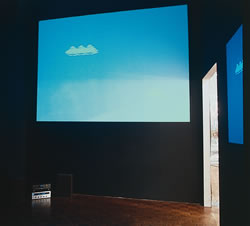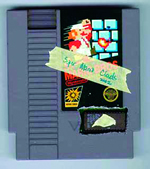|
Issue Contents :: Feature :: New Media, Old Media :: [ 1 2 3 ]
New Media, Old Media
From the remnants of pop culture past,
computer artist Cory Arcangel brings forth a new media
By Janet Paskin ’98
 Don’t look,” Cory Arcangel says, and with a whoosh, blows the dust out of a Nintendo cartridge. Plastic snaps and buttons click, and after a minute, he says happily, “Okay, look.” Don’t look,” Cory Arcangel says, and with a whoosh, blows the dust out of a Nintendo cartridge. Plastic snaps and buttons click, and after a minute, he says happily, “Okay, look.”
On the TV screen, Super Mario stands
on a square marked with a “?” suspended in the middle
of a completely blue sky. The square might yield a coin or a grow-big
mushroom if Mario were able to jump up and hit it with his head.
But in Arcangel’s scenario, Mario has nowhere to go. He looks
left, then right, then left again—and will do so as long as
the cartridge runs.
Arcangel named the piece Totally F---ed.
He giggles while it plays—the picture is, after all, hilarious, even for people who did not spend early childhood and adolescence trying to save Princess Peach Toadstool—and it is possible to forget that Arcangel ’00 is not just another happy geek. The video is only one example of his recent success. One of his other Nintendo modifications, Super Mario Clouds, was selected for the Whitney Biennial last spring, and the Guggenheim included I Shot Andy Warhol, a reinvention of the shoot-em-up game Hogan’s Alley, in a recent show.
This fall, Arcangel, who lives in New York, returned home from a contemporary art show in Basel, Switzerland, only to turn around and head to England for a six-week stint at the Liverpool Biennial International Festival of Contemporary Art.
The Nintendo game reconfigurations have been some of Arcangel’s most popular work. He also plays with text-based software; in July he and his sister Jamie put together a show called The Infinite Fill, which riffs on the old program MacPaint. The work is fun and entertaining and, at the same time, embraces and advances the traditional ideas of pop art.
“My goal was to be considered an artist, not a computer artist, to have the computer considered in a gallery context,” Arcangel says. “Strip away the video game part, strip away the hacking, and essentially what I’m doing is minimalist video art.”
Not all that long ago what Arcangel was doing was hacking the computers in Mudd Library so that when a student tried to check his e-mail, the computer shut down and the CD-ROM drive opened. Or he was spending hours looking for cool stuff on the new world of the web or traveling to Detroit with friends to hear techno music.
 After two years in the Conservatory, Arcangel switched from a major in classical guitar to the Technology in Music and Related Arts (TIMARA) program. Shortly thereafter, in a Talcott Hall dorm room with classmates Paul Davis ’00 and Joe Bonn ’00, along with friend Joe Beuckman, Arcangel started messing around with old Atari and Commodore 64 computers. The quartet used the old computers to make music, eventually producing a 12-inch vinyl called 8-Bit Construction Set on the label they called Beige. The record earned critical acclaim from techno tastemakers and was voted “best moments in art” by The New York Times in 2002. The record also included software, which could be recorded from vinyl to cassette, then loaded onto a computer with a cassette deck—very possibly the first, and only, example of a Stone Age equivalent to buying an enhanced CD. After two years in the Conservatory, Arcangel switched from a major in classical guitar to the Technology in Music and Related Arts (TIMARA) program. Shortly thereafter, in a Talcott Hall dorm room with classmates Paul Davis ’00 and Joe Bonn ’00, along with friend Joe Beuckman, Arcangel started messing around with old Atari and Commodore 64 computers. The quartet used the old computers to make music, eventually producing a 12-inch vinyl called 8-Bit Construction Set on the label they called Beige. The record earned critical acclaim from techno tastemakers and was voted “best moments in art” by The New York Times in 2002. The record also included software, which could be recorded from vinyl to cassette, then loaded onto a computer with a cassette deck—very possibly the first, and only, example of a Stone Age equivalent to buying an enhanced CD.
That project reflected an aesthetic that is still present in Arcangel’s work. He and the rest of the Beige collective worked with the Atari and Commodore not for their kitsch value, but because they were challenged by the limits of the technology. Also, the 8-bit platforms were simple enough for them to understand—and tweak—at a very fundamental level.
“The idea on the record is that you should be limited,” Arcangel says. “There are so many things you can do with modern software that you end up getting totally overwhelmed, and you get really compromised by that.”
The appropriate analogy, Arcangel says, is left over from his classical music days: You wouldn’t attempt to play Bach without first mastering a certain set of musical skills; why would you attempt the technological equivalent?
Next Page >>
|





